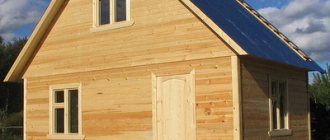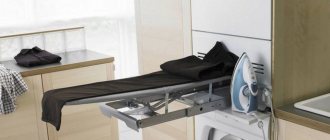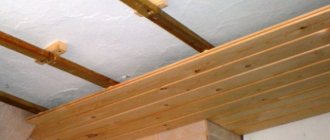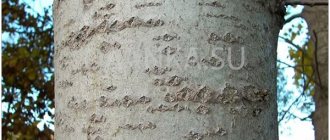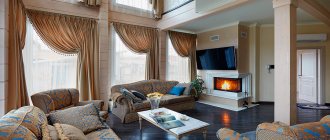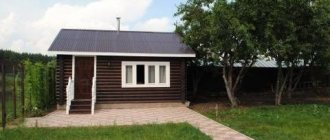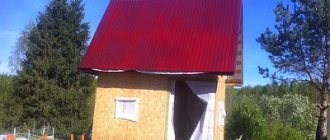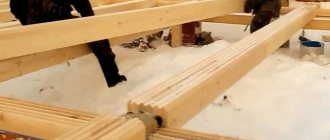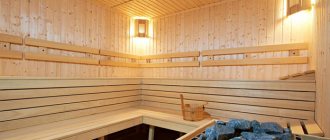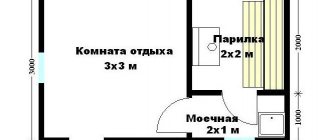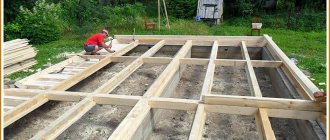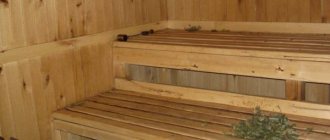In accordance with GOST 8486-86, boards and beams have a cross-sectional size and length. In simple terms, these are length, width and thickness. To correctly measure a board or beam, you need to step back about 10 cm from the end of the lumber and measure the thickness and width to avoid possible errors. And in order to find out the cost of one beam or the price of one board, you need to find out how many boards are in 1 cube and how many beams are in one cubic meter (1 m3) of lumber.
A lumber cube is a common unit of measurement for lumber. Almost all wood products: edged lumber, planed lumber, structural lumber, etc. measured in cubes (cubic meters). The only exceptions are piece products and moldings. In other words, 1 cube of lumber is a volume equal to 1 meter (1 m) in all three dimensions (width, thickness and length):
Rice. 1 – cube of lumber For example, let’s take a board 50x100x6000 mm (50 mm thick, 100 mm wide and 6000 mm long), a regular 6-meter edged board. And let's try to figure out how many boards there will be in 1 cube (1 m3). Based on the fact that all board dimensions are indicated in millimeters (1 mm), they first need to be converted into meters (1 m). For those who don’t remember how many millimeters are in a meter, let us remind you that 1 meter (1 m) = 100 centimeters (100 cm) = 1000 millimeters (1000 mm).
Therefore, the solution will be:
- 1 cube (1 m3) / 0.05 (thickness) / 0.1 (width) / 6 (length) = 33 boards in 1 cube (1 m3)
The volume of one board or one beam is calculated as follows:
- 0.05 (thickness) * 0.1 (width) * 6 (length) = 0.03 cubic volume of one board with section dimensions 50x100x6000 mm.
Now we will try to more clearly and easily answer the question “how many boards are in a cube”, find out what a “cube of boards” is and present to your attention tables for calculating the cubic capacity of boards, timber and other lumber.
Below are tables that clearly demonstrate how many boards (boards) are in 1 cube and how many timber are in 1 cube:
How many edged boards are in 1 cube
| Name of lumber | Board section size (mm) | How many boards (pieces) in a cube (in 1 cubic meter) | Volume of one board in cubic meters (m3) |
| Edged board | 25x100x6000 | 66 | 0,015 |
| Edged board | 25x150x6000 | 44 | 0,022 |
| Edged board | 25x200x6000 | 33 | 0,3 |
| Edged board | 30x100x6000 | 55 | 0,018 |
| Edged board | 30x150x6000 | 37 | 0,027 |
| Edged board | 30x200x6000 | 27 | 0,036 |
| Edged board | 40x100x6000 | 41 | 0,024 |
| Edged board | 40x150x6000 | 27 | 0,036 |
| Edged board | 40x200x6000 | 20 | 0,048 |
| Edged board | 50x100x6000 | 33 | 0,03 |
| Edged board | 50x150x6000 | 22 | 0,045 |
| Edged board | 50x200x6000 | 16 | 0,06 |
| Edged board | 65x150x6000 | 17 | 0,058 |
How many boards are there in a cube 50x150x6000: Table of all sizes!
Timber and boards are one of the oldest building materials, but they do not lose their relevance today. At the same time, the cost of these lumber forces buyers to be careful about the accuracy of calculating the required quantity.
how many edged boards are in a cube
Now you can find on the World Wide Web the necessary tables for calculating the required number of cubic meters of building materials, but a skillful owner must be able to carry out the calculation independently.
How many boards are there in a cube of 50 by 150 by 6000
As you probably already understood, the calculation of lumber is carried out in cubic meters. At the same time, a cube of boards and timber may have different overall dimensions. Therefore, for an accurate purchase, you need to understand the size of this cube for a more accurate calculation. The most common cube of lumber has dimensions of 50x150x6000 mm.
We calculate the required volume easily and simply
It is very easy to calculate cubic meters of boards or timber. To do this, you need to have basic knowledge of geometry, which we were taught at school. Thus, to determine the required cubic capacity, you need to initially multiply the width (l), thickness (s) and length (b).
For example: s boards × l boards x b boards = 50 mm × 150 mm x 6000 mm = 45000 cm/cu.
We remember that a cubic meter is equal to 1,000,000 cubic centimeters, that is, 100 cm x 100 cm x 100 cm.
Therefore, next we take the numerical indicator 1,000,000 and simply divide by the cubic capacity of the board (beam):
1000000 cubic cm: 45000 cubic cm = 22.22 pieces of board in one cube.
How many boards in 1 cube table 6m:
Board size Volume of 1 board Boards in 1 cube in pieces Square meters in 1 cube
| Fifty | |||
| Board 50x100x6000 | 0.03 m³ | 33 pcs. | 20 m² |
| Board 50x120x6000 | 0.036 m³ | 27 pcs. | 20 m² |
| Board 50x150x6000 | 0.045 m³ | 22 pcs. | 20 m² |
| Board 50x180x6000 | 0.054 m³ | 18 pcs. | 20 m² |
| Board 50x200x6000 | 0.06 m³ | 16 pcs. | 20 m² |
| Board 50x250x6000 | 0.075 m³ | 13 pcs. | 20 m² |
As you can see, it is very easy to calculate the required number of 6-meter boards. Now you know how to determine how many meter boards are in a cube. Depending on the size, you simply substitute the required dimensions into a simple formula and get the finished result.
domstrousam.ru
How much timber in 1 cube
| Name of lumber | Size of timber sections (mm) | How many timber (pieces) in a cube (in 1 cubic meter) | Volume of one beam in cubic meters (m3) |
| timber | 25x50x3000 | 266 | 0,0037 |
| timber | 30x40x3000 | 277 | 0,0036 |
| timber | 30x50x3000 | 222 | 0,0045 |
| timber | 40x40x3000 | 208 | 0,0048 |
| timber | 50x50x3000 | 133 | 0,0075 |
| timber | 50x70x3000 | 95 | 0,01 |
| timber | 50x50x6000 | 66 | 0,015 |
| timber | 100x100x6000 | 16 | 0,06 |
| timber | 100x150x6000 | 11 | 0,09 |
| timber | 100x200x6000 | 8 | 0,12 |
| timber | 150x100x6000 | 11 | 0,09 |
| timber | 150x150x6000 | 7 | 0,135 |
| timber | 150x200x6000 | 5 | 0,18 |
| timber | 150x300x6000 | 3 | 0,27 |
| timber | 200x200x6000 | 4 | 0,24 |
How many tongue and groove floor boards are there in 1 cube?
| Name of lumber | Board section size (mm) | How many boards (pieces) in a cube (in 1 cubic meter) | Volume of one board in cubic meters (m3) |
| Floor board | 38x110x6000 | 39 | 0,025 |
| Floor board | 38x145x6000 | 30 | 0,03 |
| Floor board | 40x110x600 | 37 | 0,026 |
| Floor board | 40x150x6000 | 27 | 0,036 |
| Floor board | 45x110x6000 | 33 | 0,029 |
How much wooden paneling in 1 cube
| Name of lumber | Board section size (mm) | How many boards (pieces) in a cube (in 1 cubic meter) | Volume of one board in cubic meters (m3) |
| Wooden lining | 17x95x6000 | 103 | 0,009 |
| Wooden lining | 18x95x6000 | 97 | 0,01 |
| Wooden lining | 19x115x6000 | 76 | 0,013 |
| Wooden lining | 19x145x6000 | 60 | 0,016 |
| Wooden lining | 20x100x6000 | 83 | 0,012 |
| Wooden lining | 20x150x6000 | 55 | 0,018 |
So if you seriously decide to build a country house or a bathhouse from timber and edged boards, then thanks to the above tables for calculating the amount of lumber in one cube, you will know exactly how many boards and how many timber will be needed for construction.
How many boards are in a cube: table, online calculator and calculations
The high cost of construction and finishing materials makes us think about their rational use. Wood has always been one of the most expensive. If you actively use it, then it is advisable to find out in advance how many boards are in the cube. A table with reference data will allow you to determine the required value. You can use the board cubic capacity calculator, which allows you to change the geometric parameters of timber and other products online, or you can calculate the cubic meter yourself. We invite you to familiarize yourself with the most popular types of materials and the features of their calculation.
The amount of lumber in a cube may vary
The content of the article
Types and types of lumber, its features and scope of application
Before calculating how many boards are in a cube, you should decide on the type of material that will be used in the process of constructing or finishing a particular object. The processing features and appearance of the lumber determine its possible area of use. We invite you to familiarize yourself with the most common types and their main purposes.
Lumber comes in different types and types
Edged timber
The timber has a square or rectangular cross section. Its linear parameters usually exceed 100 mm. For production, the core of wood is used, which is processed on four sides. The result is lumber of the desired geometry, but without finishing the surfaces. The standard length of the product is usually 6 meters. When deciding how to calculate cubic capacity, this linear parameter must be taken into account.
In demand during the construction of capital buildings. Given the quality of the surface treatment, additional finishing will be required in the future.
Edged timber is actively used in the construction industry
Planed timber
Solid wood is used to make planed timber. The choice is made in favor of logs that do not have defects, with transverse dimensions of more than 150 mm. The most widely used timber is with dimensions 100×100; 100×150; 150×150; 150×200 mm. The latter standard size is most often made to order and has a cost higher than analogues with smaller geometric parameters.
Planed timber is widely used in the construction of residential buildings and the installation of internal partitions. The high quality of the surface allows you to avoid additional finishing.
Planed timber has a smooth surface
Planed block
The cross-sectional shape may vary. Manufacturers offer bars with a square, rectangular or other cross-sectional shape. Requirements have been established for the aspect ratio of the finished product. Their width cannot be twice the thickness. The last linear dimension can reach 100 mm.
Planed products subjected to special processing have a smooth surface. They are widely used in the construction of various buildings, the appearance of which is subject to increased demands. Actively used in the furniture industry.
Planed bars have a wide range of uses
Edged block
Unlike planed edged timber, it does not undergo additional finishing processing. This significantly reduces its cost. Widely used in the construction of frame buildings and installation of structures intended for installation of facing material.
Edged timber can strengthen any structure
Edged board
The thickness of such lumber can reach 100 mm, and the transverse dimensions in this case should be at least twice as large. During the production process, wood is processed from all sides. As a result, it is possible to ensure the necessary geometric accuracy and relative evenness of the surface.
Edged material is used when performing various types of work. Especially popular is the inch board, the size of which is numerically equal to 1 inch (25 mm). This thickness is in demand when constructing sheathing, floors and many other surfaces.
How to calculate a cube? It is enough to multiply the linear parameters to find the volume of one product. Then divide one cube by the resulting value. This will allow you to find out how many products will be in a cubic meter. Knowing the required number of products and how many of them are in a cube, it is easy to calculate the order volume.
Edged materials are indispensable in construction
Floor board
Designed specifically for flooring installations. It has a width of 85÷140 mm and a thickness of 27÷45 mm. The choice of linear parameters of the product is made taking into account the subsequent operational load. An online calculator of boards in a cube will allow you to calculate how much material you need to purchase to install a floor covering of a certain area.
Floorboards are intended for flooring
Unedged materials
Unlike edged material, such lumber has a lower cost, since its surface has partially sawn or unsawed edges (wane). Because of this, it is most often used in the manufacture of fences or the construction of rough surfaces.
Unedged materials have an affordable price per cubic meter
How many boards are in a cube: table with standard sizes
Knowing how many square meters are required, how many boards there will be in a cube, depends on the linear dimensions of the selected material. Using special reference books (cubes), you can find the required quantity from the tables without tedious calculations.
The table will help you find the desired value in the cube
How many boards are in a cubic meter: the table will allow you to find out without calculation
Reference tables contain information data for lumber of various lengths. Before you find out from the table how many boards are in a cubic meter, you should check all the linear parameters, and not just the width and thickness.
The most popular are reference tables for boards with 4 or 6. So, if we talk about how many edged boards measuring 25 by 100 mm will be in a cube, you should definitely check the length. Four-meter ones - 100 pieces, six-meter ones - 66 (66.6). Based on this, it is determined how many cubes of lumber are required.
Advice! If it is difficult to find reference tables, use the cubic meter calculator, which will help you perform the necessary calculation in a fraction of seconds.
Having determined the quantity from the table, it is worth finding out how much a cube of the board weighs. To do this, you need to know the moisture content of the material. To find the answer to the question, you need to multiply the density by the volume, expressed in cubes.
The density of wood depends on its moisture content: reference table
The basic procedure for calculating the number of boards per cubic meter
Before moving on to basic calculations and learning how to calculate a cube, you should pay attention to the unit of measurement. For wood, the unit of volume is the cubic meter. Often cubic meters, cubic meters or cubic meters are used as a symbol.
Attention! One cubic meter is numerically equal to the volume of a cube whose edges are 1 meter long.
How to calculate cubic meters? It is enough to multiply the linear dimensions of the boards or timber. In other words, the volume will be equal to the product:
V = L × h × b, where
- V – the required volume of the cube, m³;
- L – product length, m;
- h – height/thickness of the material, m;
- b – width, m.
Calculating the volume of a cube is easy.
Attention! All linear parameters must be expressed in meters. If dimensions are given in millimeters, to convert to meters each original value should be multiplied by 0.001.
With the same number of square meters, how many products there will be in a cubic meter will depend on the selected thickness. If the height of the material used is large, then according to the calculations in the cube, a smaller value will be obtained. By reducing the thickness of the board, you can increase the number of products purchased.
When determining how many boards are required, it is necessary to take into account the degree of processing of the material, the grade and type of wood that was used for production. For edged and unedged lumber, the calculation will be slightly different. The calculation should be adjusted to take into account the usable area.
When calculating how much trimming material is needed, you should:
- Determine the linear dimensions of one board;
- Find the volume of one product;
- Divide 1 (cube) by the volume of one board to understand how much will be in one cube. According to calculations, the result may not be an integer value.
To find out how much unedged board is needed, you need to take measurements at several points. After this, the desired linear size is averaged, and the found value is subsequently used when performing calculations.
Unedged products should be sorted by size
If there are a lot of boards and their linear dimensions differ, when starting calculations, sort by length and width. It is desirable that the linear parameters differ by a maximum of 10 cm. Then the height and length of the formed stack are measured. The height is measured in the middle. The obtained result is multiplied by a correction factor, the numerical value of which is 0.07÷0.09 units. Its meaning can be found in the cubature reference book.
Board cubic capacity calculator
If you need to perform a calculation, the board cube calculator below will allow you to find the desired value in a matter of seconds:
Thus, knowing how to calculate cubic capacity, it is easy to reduce construction costs. If you still have questions about the calculation procedure, ask them in the comments.
Did you like the article? Save so you don't lose!
housechief.ru
